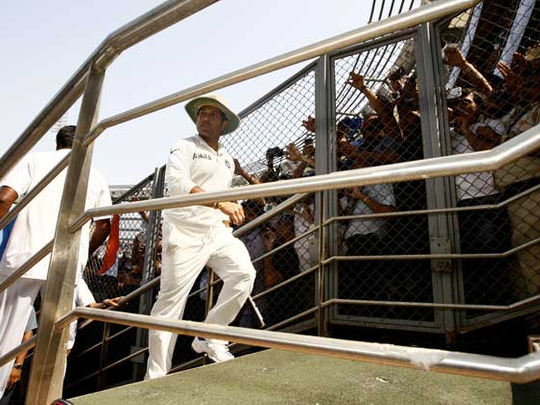
London: Sachin Tendulkar finally retired in 2013 but the outpouring of emotion at the end of his illustrious career could not disguise cricket’s ongoing struggle to combat the menace of spot-fixing.
At the age of 40 and following his 200th Test, Tendulkar, bowed out last month with more than 34,000 international runs to his name, plus most of cricket’s major batting records. There was more disappointment in store for lovers of the game when Jacques Kallis, the South African stalwart, decided to retire from Test cricket at the end of their two-Test series against India.
Not long after Tendulkar retired, fellow Mumbai batsman Rohit Sharma showed there was life after the ‘Little Master’ by emulating the great man in scoring only the third one-day international double hundred, against Australia.
The national mood was rather different when Tendulkar’s former team-mate Shanthakumaran Sreesanth, was arrested by Delhi police and, in May, taken to court on allegations he’d been bribed to concede an agreed number of runs in the country’s cash-rich Indian Premier League.
Sreesanth and two other cricketers were released on bail, protesting their innocence.
Meanwhile former Bangladesh captain Mohammad Ashraful confessed to match-fixing in his country’s Twenty20 tournament while former New Zealand batsman Lou Vincent said he was one of three ex-Black Caps being investigated for alleged match-fixing.
On the field, India pounded Australia 4-0 and problems intensified for Australia when opener David Warner was left out of the side for the first two Ashes Tests for punching England’s Joe Root in a Birmingham bar.
More controversy arose when Australia coach Mickey Arthur was sacked just weeks before the Ashes, where England batsman Ian Bell made up for top-order collapses by scoring centuries in England’s three victories.
Cricket’s urge to want its players to uphold the ‘spirit’ as well as the rules of the game and its fraught relationship with technology came together when England batsman Stuart Broad refused to ‘walk’ during the first Test at Trent Bridge.
New Australia coach Darren Lehmann accused Broad of “blatant cheating” and encouraged Australia fans to make him cry during a return series where the spiteful atmosphere has been exacerbated by the unusually short gap between Ashes series.
England’s repeated failure to make 400 in the first innings caught up with them in crushing defeats in Brisbane, Adelaide, Perth and Melbourne where recalled left-armer Mitchell Johnson, one of the few genuine fast bowlers left in the game, starred and Australia captain Michael Clarke showed his enduring class with the bat.
England also had to cope with seeing senior batsman Jonathan Trott return home after the first Test with a stress-related illness.
Elsewhere, South Africa defeated Pakistan 3-0 at home and drew 1-1 with them in the United Arab Emirates to remain top of the Test rankings.
World 50-over champions India also proved their playing strength by winning the elite Champions Trophy, defeating hosts England in the final of what the ICC said would be the last edition of the tournament.
Zimbabwe enjoyed only their fifth victory against a major Test nation when they beat Pakistan in September.












